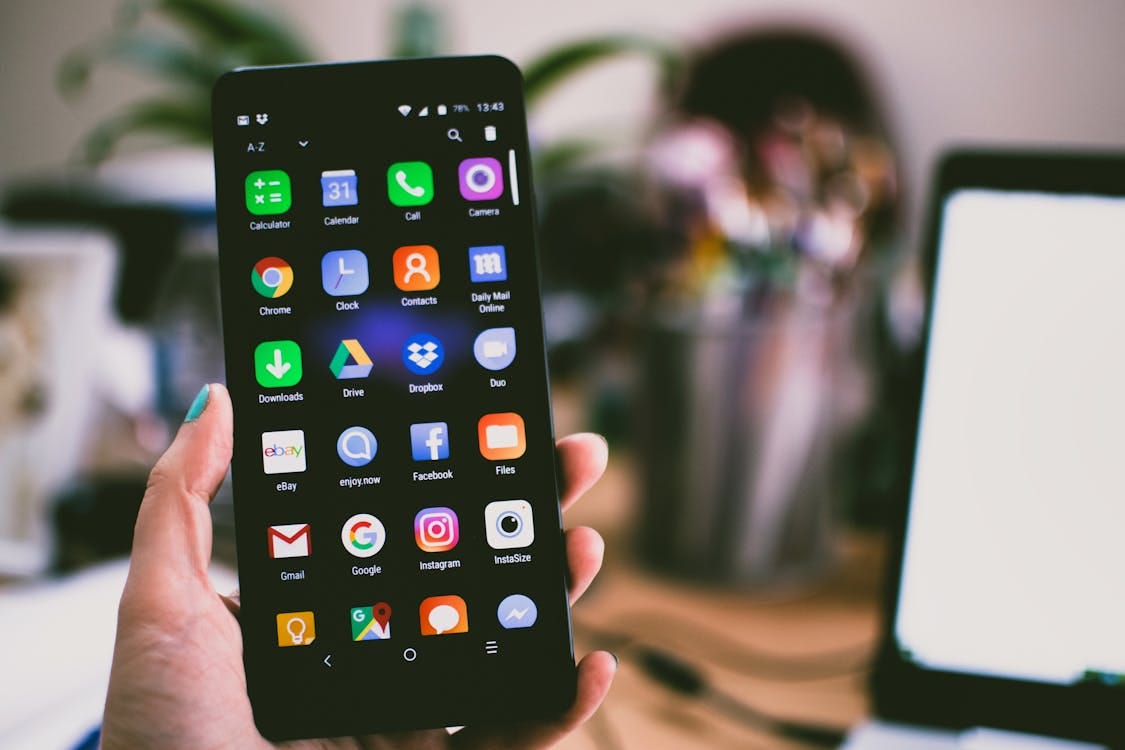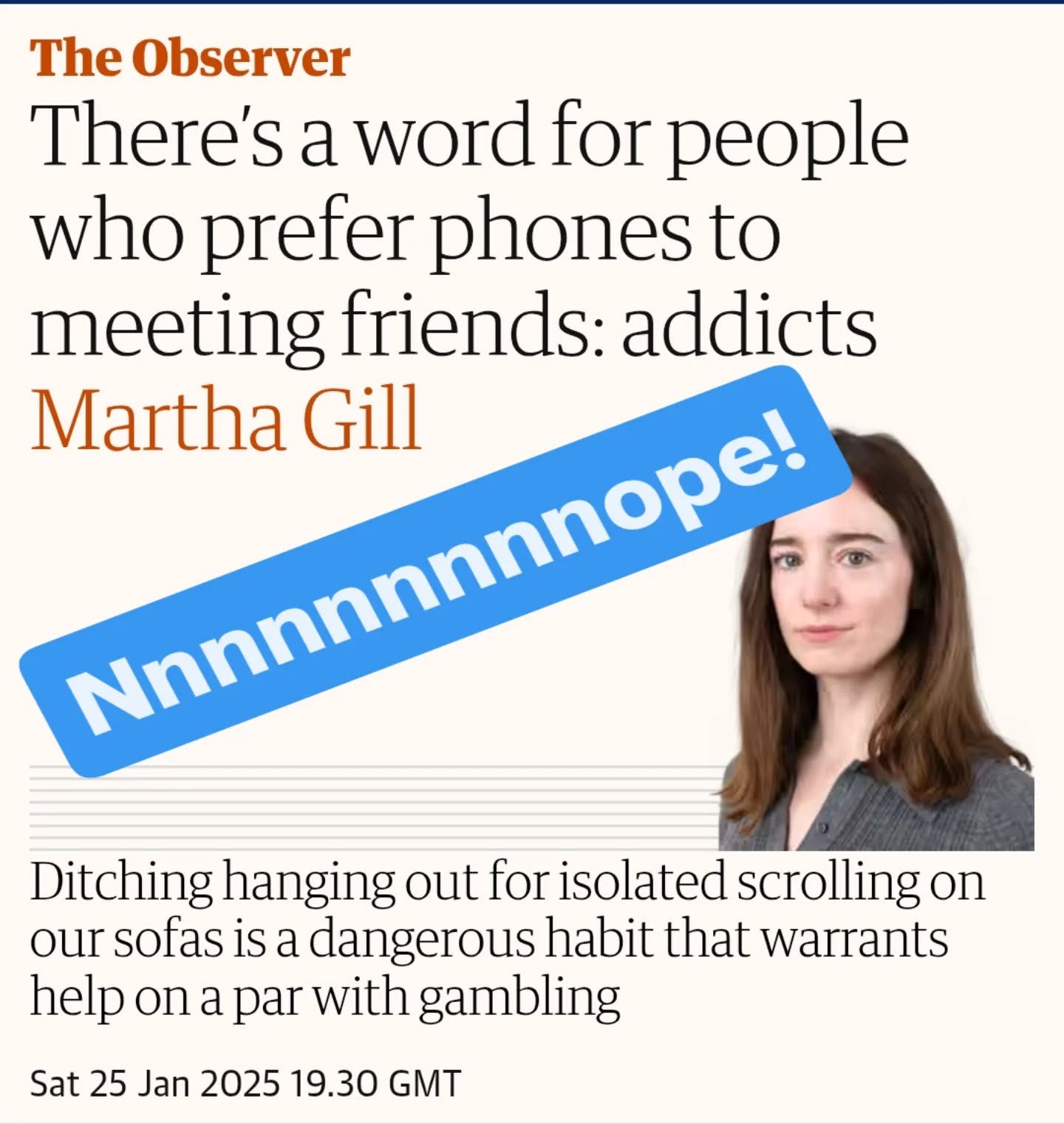Are you addicted to your phone, or does Martha Gill need more friends?
Another day, another Guardian column that demonises smartphones and tech for very dubious reasons. But such casual invoking of the label 'addiction' could be causing actual problems.
I promise I didn’t set up this blog with the intention of dedicating every other post to critiquing something published in the Guardian about devices or phones. But they keep pumping out stuff that requires it, by dint of being potentially rather dangerous.
Today’s example is “There’s a word for people who prefer phones to meeting friends: addicts”, by Martha Gill1.
I’m not going to dissect the piece line by line, because I have, you know, a life, a family etc.
But here are some highlights that call the central premise of the piece2 into doubt.

Spending time on your phone at home is NOT the same as ‘isolation’ and ‘solitude’
Gill’s initial arguments rest on the notion that if you’re not socialising with people in person, you’re automatically experiencing loneliness, isolation, solitude3.
Admittedly, you might be experiencing such things. But it’s by no means a given. Because, while common, this viewpoint misunderstands how both modern technology and human brains work.
Countless people use their phones/devices to communicate with others. Calls, messages, social media, interactive games, and sharing videos/memes/artwork, this all makes up the lions share of what the typical phone is used for. Ultimately, our phones mean we communicate with others more than ever before.
While I have gone on the record many times agreeing that real-world interactions are more stimulating and enriching, online communication still gives our brains plenty to work with, communication-wise. Evidence suggests that online relationships can be as intimate and enriching as real world ones.
It’s accurate to say that a Ferrari is faster than a Ford Focus, but that does not mean the Focus is therefore stationary. It’ll still get you there. And so it is for online and real-world interactions.
Point is, while using your phone more may mean you’re physically isolated, you’re by no means mentally isolated.
Gibb’s opening passages state:
“one feature of humanity that we can claim to be uniquely our own… we self-sabotage”
This is obviously incorrect. No other species has WiFi. We are cognitively very different, and should be considered as such.

There are ample good reasons for not engaging with others ‘in person’
Another defining premise of Gill’s piece seems to be, if someone opts to avoid physical interactions with others, the only reasons they have for doing so are negative, and ultimately bad for them/their wellbeing.
Obviously, this is wrong. For many reasons.
One being, social anxiety disorders are one of the most common mental health complaints. Because while humans being inherently social creatures, this means social interactions are incredibly significant and demanding for the basic brain.
For some people, they’re too significant, and can be perceived as more of a high-risk effort than rewarding experience, unless it’s someone they know they can trust. To put it in more modern parlance, they lack the spoons for dealing with people.
And so, we get introverts. And online communication has proven to be a literal lifeline for such types. Indeed, online communication has been shown to reduce social isolation, in many countries. And that’s before we add official mental health issues into the mix.
But apparently, being an introvert and/or preferring online interactions is inherently bad. Gill’s column bemoans such behaviour, particularly in the young, casting a very negative view on the way youngsters will now openly admit to social anxiety, rather than, bottling it up forever and forcing themselves to endlessly stressful socialising? That’s great for wellbeing, no doubt.
Presumably, with her conclusion that staying indoors being considered ‘uncool’ was “the peer pressure that pushed otherwise lazy teens off their sofas and out into the world” Gill considers the drastic decline in youth alcohol consumption a sign of societal decay.
But maybe I’m wrong. After all, what valid reason could anyone have for not going out and socialising in a time of post-pandemic flu surges, rocketing costs of living and house prices, diminishing job opportunities, crumbling public transport, and so much other stuff going on?
No, the only explanation is those wretched phones.
Smartphone ‘addiction’ is not an established thing (and insisting otherwise can be dangerous)

The main point of Gill’s piece is that we need to start referring to people who opt to spend time on their phones rather than in real life interactions as addicts.
Respectfully, I couldn’t disagree more. And here’s why.
While it’s become increasingly common in the mainstream to refer to ‘Smartphone addiction’, that’s not something that the medical community agrees is ‘a thing’. Not yet, anyway. They may lean towards that, as evidence builds. Or they may not, if the accumulating evidence doesn’t support that move.
There’s an entire article to be written about why phones and other devices shouldn’t be classed as ‘addictive’ (and it’s one I’m working on), but suffice to say, “addiction” is very significant and important clinical diagnosis. Not something that should be deployed on a whim.
True, you will find examples of the term ‘smartphone addiction’ in the scientific literature. Gill cites a few herself (although the main one is by a Chinese institution and researchers, so translation issues may be at work). But even this can be problematic, and is not something that the global medical organisations have adopted.
But here’s the thing: if we did accept that smartphone addiction is real, and should be treated as seriously as any other addiction, this article is completely counterproductive.
If we’re treating smartphone addiction as a genuine clinical disorder, then it should be assessed by trained professionals, not columnists with a diagnostic rigour that seemingly amounts to “They aren’t meeting up with me in person = They have a genuine mental disorder”. Such unqualified, armchair diagnosis doesn’t help anyone. Quite the opposite, if people’s mental wellbeing is actually something you care about.
Perhaps more importantly, the terms ‘addiction’ and ‘addict’ are loaded with stigma, which regularly means those with the relevant disorders avoid coming forward for treatment, for fear of the judgement and scorn they will receive.
Ergo, if you genuinely do feel that people who stay indoors with your phones need help, labelling them all addicts in a national newspaper is not the most counterproductive thing you could do… but it’s in the Top 3.
That’s assuming people who opt to communicate via their phones rather than in person aren’t doing so because their existing mental issues make this easier. Because if such people do exist in their millions, convincing the rest of the general public that they’re all antisocial addicts can only be harmful to them.
Does Martha Gill needs more friends?

I’m not the first person to flag this up, but… does Martha Gill not have enough friends?
Because this is actually her second piece along this theme in less than a year. The vibe of the first one is more “I have loads of friends, who said I didn’t?”, while this one comes across as more “Anyone who doesn’t want to hang out with me should be diagnosed”.
Despite what I’ve written here, I bear no ill will towards Martha Gill4. A lot of her back catalogue is fine and agreeable5.
But the whole vibe of this piece, which also throws in some “lazy teens” stereotyping and increasingly (and bleakly) common “Remote working is bad, actually” implications, let’s say… it’s not a good look.
And for what it’s worth, I’d argue that even the most sociable person would probably think twice about spending one-on-one time with someone who would turn their perceived flaws into a condemnatory national newspaper article.
But that’s just me. I’ve always been a bit unsociable in that regard.
Relevant books of mine:
For how the brain perceives face-to-face and online communication, Emotional Ignorance
For a deep dive into the science of addiction, Psycho-Logical
For a full explainer of online relationships and communities, Why Your Parents Are Hung-Up on Your Phone and What To Do About It
Technically, it’s published in The Observer, but I’m comfortable with including it under the Guardian umbrella.
i.e. that people who reject in-person social interactions do so because they’re literally addicted to their phones
This stance is amplified by describing phones etc. as ‘personal entertainment devices’, suggesting they’re solely for pleasure and distraction
This is a fun sentence to say out loud. Just FYI.
And she’s very friendly, I hear.





I'm enjoying your critical analysis plus humour. Writing goals. Thanks.
This is a brilliant read. And "it’s accurate to say that a Ferrari is faster than a Ford Focus, but that does not mean the Focus is therefore stationary" is such a fantastic way of putting it!